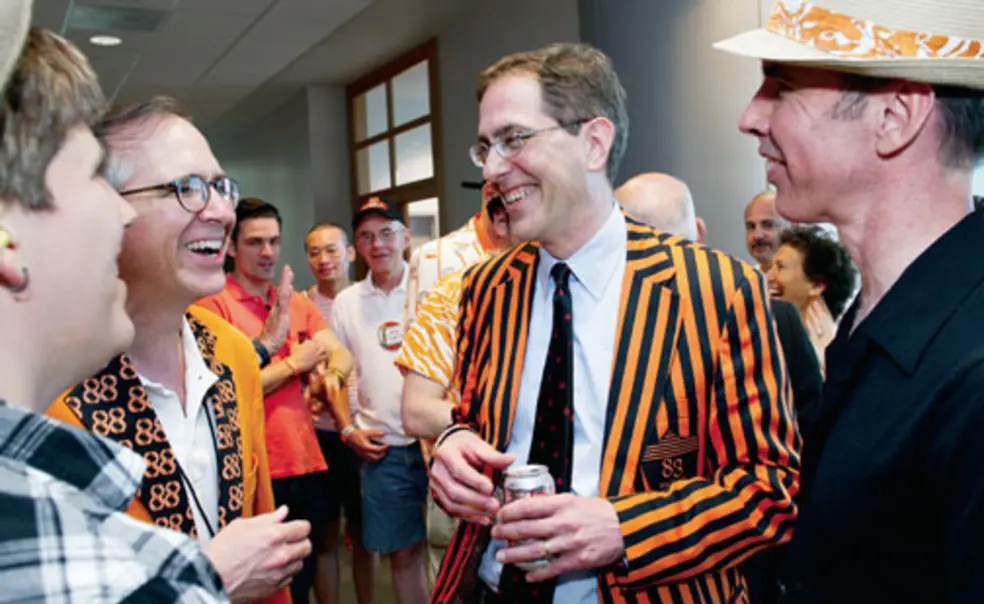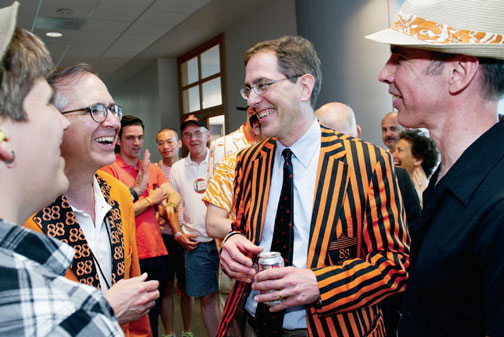Beginnings
Each of us has his or her own story about the beginning of our Princeton experience. This month, 1,289 freshmen and 586 graduate students will write the first lines in their own Princeton adventures. Surprising encounters, new freedoms, and thrilling discoveries will create memories that remain vivid for a lifetime. For most of the new arrivals, “Princetonian” will quickly become a defining element of their identities, binding them to generations of alumni past, present, and future.
For me, too, this September marks a new beginning. Much of my first year as president will be devoted to what is now typically called a “listening tour.” I am dining with students in their clubs and residential colleges, visiting with athletic teams and extracurricular organizations, meeting with academic and administrative departments, and participating in introductory gatherings with alumni around the country.
During these sessions, people often ask for my vision of the University. I demur, explaining that I really do want to listen before articulating a vision. What I have for now are questions. On the day of my appointment to Princeton’s presidency, I described five of them — and have added a sixth — that guide what I am hoping to learn from my discussions.
How can we make the gift of a Princeton education accessible and beneficial to a greater range of people? Princeton alumni treasure the time they spent here. If we can find ways to make that special experience available to more people, we should do so. Princeton has acted on this principle many times over the past five decades, by breaking down barriers based on sex, race, and religion; by creating a financial aid program that makes Princeton affordable to students from all socioeconomic backgrounds; and by expanding the size of the undergraduate student body. We should look for ways to make further progress.
How can we ensure that our research addresses the questions that matter most to this nation and to the world? Great universities are founded upon the conviction that research and scholarship make the world a better place, both by improving our material wellbeing and by enhancing our understanding of what makes life meaningful. We must ensure that Princeton’s faculty has the support it needs to do work of the highest quality. And we must find ways to address the questions, basic and applied, that matter most to the world, without being confined by disciplinary trends or boundaries.
What can we do to fully engage every student who comes to this University? We hope that every undergraduate and graduate student will find inspiring mentors, rewarding activities, challenging assignments, and energizing peers. We do well, but we could do better. To take a simple example, some students get to know several professors personally, while others almost never go to office hours. If we engage students more thoroughly, we will educate them better. What does the advent of online education mean for Princeton, and how do we wish to participate in it? Faculty members throughout the University are experimenting with how online tools can improve their pedagogy, and Princeton’s free offerings on the Coursera website have made some of our best teachers accessible to the world. Peer universities have gone further, offering credits, certificates, or even degrees online. Most of these projects are ill-suited to Princeton’s mission and values, but we should ask whether online programs consistent with the University’s mission might exist.
How can we cooperate with and assist other universities and colleges that share our scholarly ideals but face severe financial or political pressures? Liberal arts education, the humanities, and basic research have all come under attack from politicians focused on shallow, short-term measures of value. Princeton must play a leadership role in the public debate about higher education, speaking up not only for our own needs but also on behalf of the many colleges and universities upon whom America’s young people, and the nation’s future, depend.
How best can we inculcate and exemplify an ethic of service? After I listed my questions, John O. “Dubby” Wynne ’67, a Princeton trustee and the national chair of our Annual Giving campaign, pointed out to me that while the ideal of public service was implicit in several of my questions, it deserved separate mention. He’s right, of course. The commitment to be “in the nation’s service, and in the service of all nations” is fundamental to this University, and we should always be asking how we can live up more fully to Princeton’s informal motto.
I am enjoying my conversations with the Princeton community. And, as students new and old arrive and infuse the campus with energy, I am grateful to have my own opportunity to refresh my perspective upon and appreciation for this special college in New Jersey about which we all care so much.














No responses yet